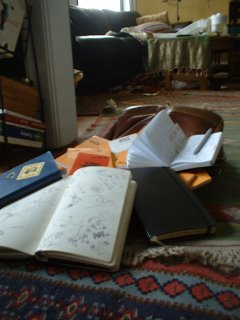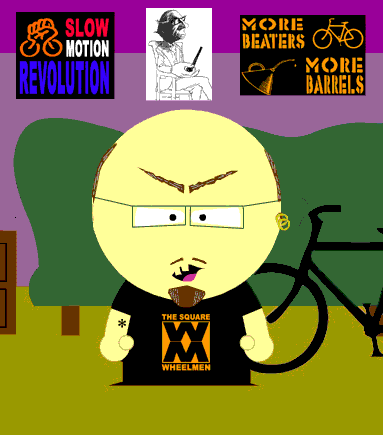What's in your bag?
Can you dig it?
 Both Jen in Chicago and Cyclelicious have posted on the contents in their bike bags. That and yesterday's plunging temps inspired me to do a little digging of my own. I found the following short story, Bang, Bang, Bang, in one of the travel notebooks I keep in my bike bag. I wrote it a few months after I moved into my four-flat here in Lincoln Square. It describes a Bosniak contractor who spent a week rebuilding our back porches.
Both Jen in Chicago and Cyclelicious have posted on the contents in their bike bags. That and yesterday's plunging temps inspired me to do a little digging of my own. I found the following short story, Bang, Bang, Bang, in one of the travel notebooks I keep in my bike bag. I wrote it a few months after I moved into my four-flat here in Lincoln Square. It describes a Bosniak contractor who spent a week rebuilding our back porches.[Editor's note: This last picture of a bicycle on a blood-stained Sarajevo street was taken by Annie Leibovitz in 1993. It appears in her new 2006 book, A Photographers Life, Random House. I found it over at The Washington Post.]BANGThe slow, rhythmic sound starts deep in the center of my building and reverberates up, out through my top-floor apartment. It was a late night so the impact has much more of an impact on me this morning than it should. Most likely, it's the crew my landlady hired to build the new decks out back. I get up, look out the kitchen window. I see no one.
BANG
BANGBANG
BANG
BANGI make an espresso, light a cigarette and go down the front stairs, because there's a stack of 1 x 6's blocking my back door. I go into the alley alongside my building. Big chunks of concrete are piled waist-high against the wall. Around the corner, in back, there are higher piles of concrete. It looks like those black-and-white shots of Berlin after the war when little old ladies and children were cleaning up the rubble.
BANG
BANG
BANGNo one's around except for this one guy breaking up the entire walkway with a long, pointed iron bar. He's sweating at nine in the morning. I remember seeing him last week when he and the rest of the crew were putting up the flooring and stairs. The whole crew is from the Balkans, like my landlady, Ezma. The boss is Macedonian, another is Serb, and two others are Bosniaks: Muslims from Bosnia-Hercegovina. He's one of the Bosniaks. I don't remember speaking to him.
BANGHe apparently remembers me too, and stops breaking the concrete. We talk about nothing in particular - the decks, the weather. The conversation slowly turns to the more personal. He tells me that he came to the States six months ago, directly from Bosnia-Herzegovina. He has a wife and two sons, aged 19 and 16. The youngest is good in school. The other is a problem. He doesn't work much. Has a girlfriend and a car here in America.
BANG
BANGWe talk about the war, because I happened to have been there in 1991 when it all began. I then came back in '93 to teach at an underground university in Tuzla. He knows Tuzla well; he went to mining school there. He's from a small village near Doboi, half an hour to the east, and worked in Kladanj, one hour south. Kladanj is famous for its mineral springs - they call the water from there Muzshe Voda, or Man's Water. It's good for restoring a man's vigor.
BANG
BANG
BANG"War, no good," he says flatly, imitating a gun with his fingers and shooting no one in particular. The Serb paramilitaries drove him and his family from Teslik in '92. He joined the army, fought against them in Central Bosnia with the 7th Armija for 3 years. "War, no good," he repeats, opening his arms, hands parallel with the blasted concrete. He shows me two ugly scars on his right leg. He doesn't explain where they come from, but they look like shrapnel wounds: ragged, star-shaped, one on the inside of the calf and one near his knee. Same thing on the other side, a little farther up.
BANGI get him some water with ice. We smoke his cigarettes. He tells me he's very proud of the work they're doing, as he gives the supports a firm shake. The main floor beams are notched and bolted at every joint. He shows me how they have sanded down all the rough edges on the stairs, railings, and banisters. Everything is steady, solid.
BANG
BANGIn '93 there wasn't a building left standing out in the countryside. When I was there in 2001 most of them had been rebuilt. It seems like every Bosnian knows how to lay foundations, raise walls, and set the roof in just a few days. They have an extraordinary skill for knocking things down and building them back up.
BANG
BANG
BANGIf everything goes well, he tells me, he won't have to work weekends or holidays much longer. It's apparently been a rough time for them recently: he had been shuffling bags at the Loop Sheraton but was let off during the recession. He and his family lost their apartment, and now they live with the crew boss. He's saving up money to go back to school, maybe get back into engineering. That, or open a restaraunt.
Labels: kunst, Lincoln Square, writing







1 Comments:
Excellent post - puts things in perspective don't it?
Post a Comment
<< Home